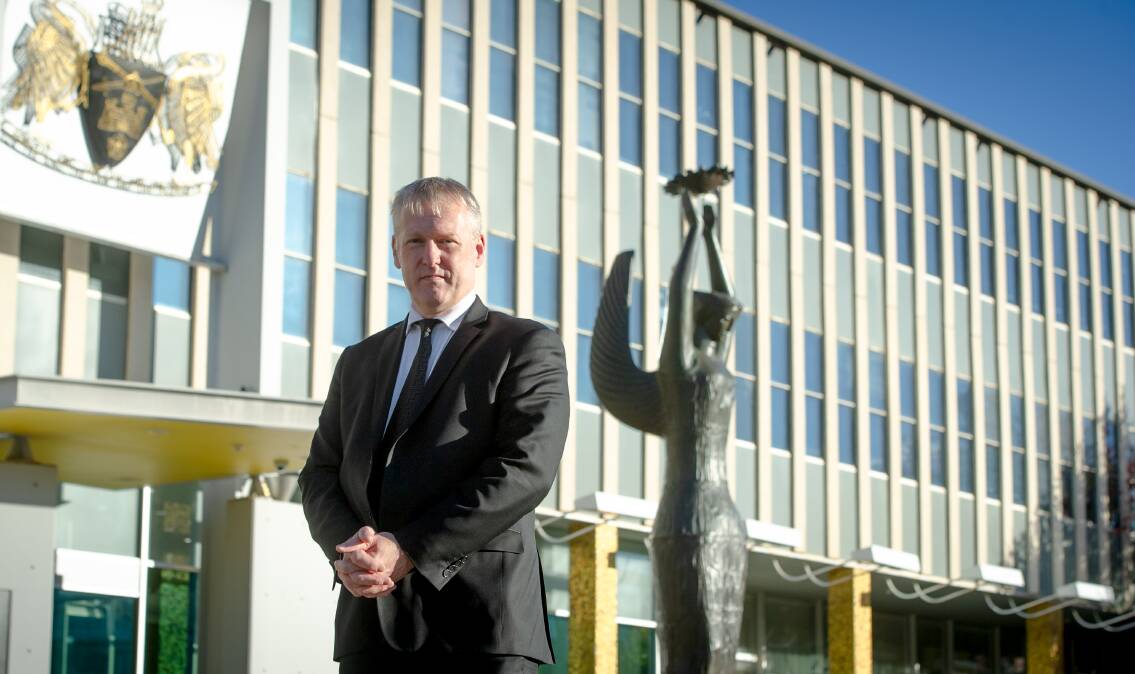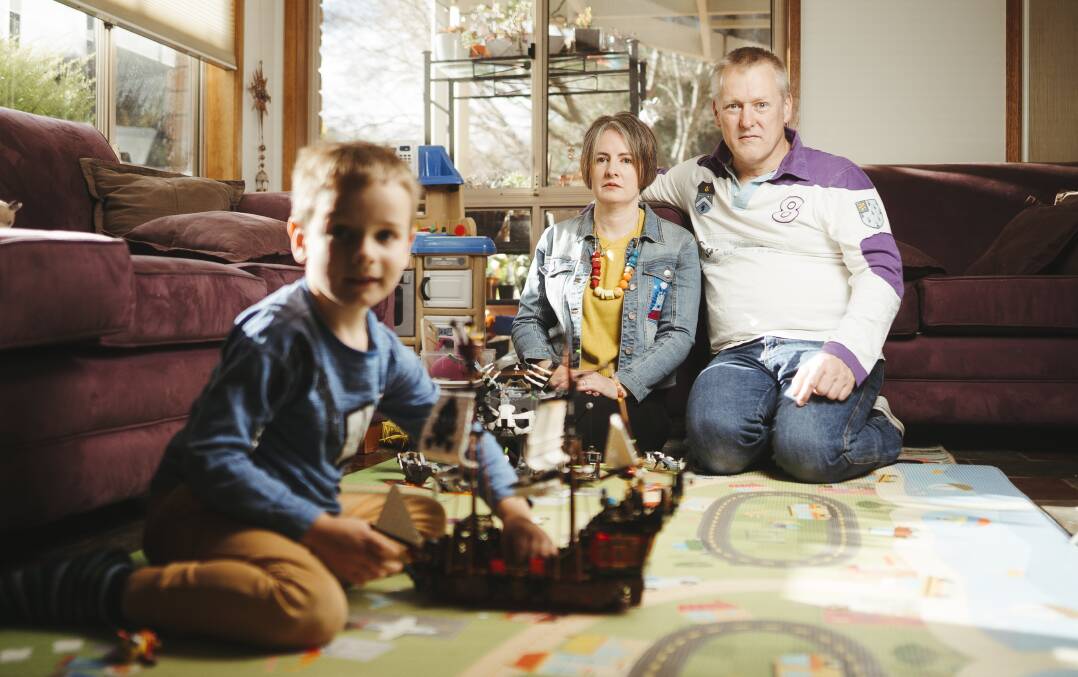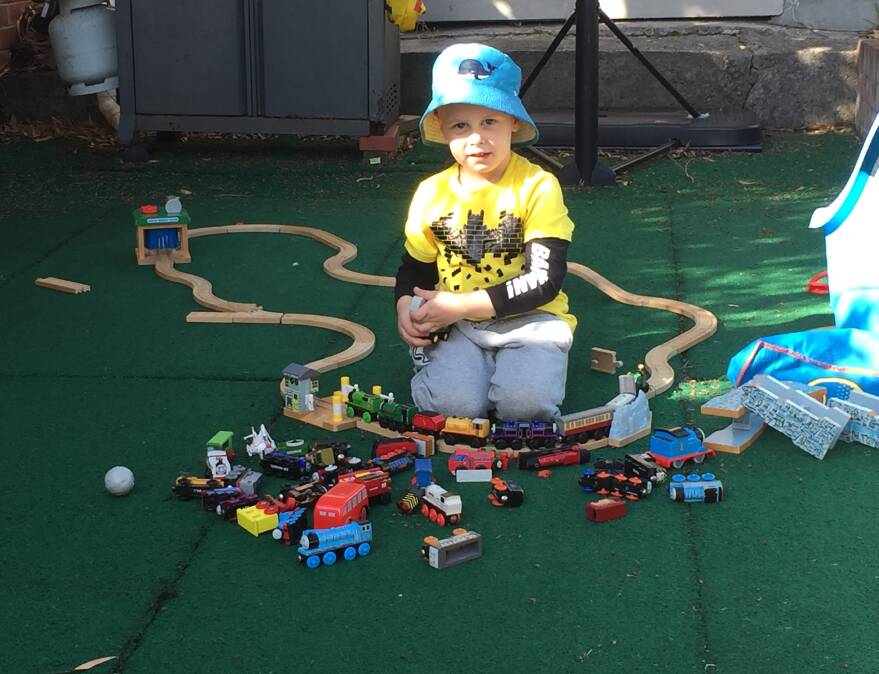
The father of a four-year-old boy who was killed in a truck crash in Canberra's south has welcomed the ACT government's agreement with the coronial inquest recommendations that followed his son's death, saying he was hopeful the issues would be addressed meaningfully.
But Andrew Corney said there needed to be a review of sentences that could be imposed on drivers who kill people on the roads, taking into account whether the laws are acting as deterrents, meeting victims' needs and whether they are keeping the ACT safe overall.
"When you look at what happened in Sydney recently with the driver who killed the four children: he had a sentence of 28 years, 21 non-parole. That's certainly a lot closer to what I would think is in the ballpark," Mr Corney said.
"I'm not saying the driver in the circumstance who killed Blake should get 28 years, but the difference between three years and nine months and 28 [years] is an absolute gulf when I would think some of the factors are not that dissimilar."
Blake Corney, 4, was killed after a truck crashed into the back of his family's car in July 2018 on the Monaro Highway. Chief Coroner Lorraine Walker said mandatory health checks and reporting for drivers, along with better safety technology, could have saved the boy's life.
The ACT government formally responded to the recommendations from the coronial inquest in the Legislative Assembly on Thursday, including a commitment to make medical practitioners report unfit drivers under new laws.
Mr Corney said he believed human rights and the interests of the community could be balanced when legislating for mandatory notifications from health practitioners to licensing authorities about medically impaired drivers. The ACT government said it would pursue this change.
"If you look at it and said, 'Would you trust something with a gun who was unstable, liable to sleep, irresponsible?' The answer's almost certainly going to be no," Mr Corney said.

"A truck is a lethal weapon. It hits people with far more force than an ordinary car."
Mr Corney said he wanted to be confident change would happen and had been assured by Transport Minister Chris Steel, but "the idiosyncrasies of any political environment are such that there could be change of government, change of minister and things don't happen".
Doctors have expressed caution about introducing any legislation which affects the trust which exists between themselves and their patients.
The president of the Royal Australian College of General Practitioners, Professor Karen Price, said that patients "know and trust" their GPs "and the last thing we want to do is create a situation where patients are not forthcoming because we will be hindered in our capacity to get to the bottom of what is really going on and help them".
"Any new laws must strike the right balance and preserve the trust that, as the Minister himself notes, is indispensable to the therapeutic relationship that exists between a health practitioner and their patient," she said.
She added that the college would carefully examine any legislation and urged the government to "consult closely with GPs to ensure the legislation is workable".
"How these reports are managed by the government is also of the highest importance since we must do everything possible to protect the confidentiality of patient health information."
The Australian Medical Association was reluctant to comment specifically on the government's proposal to require health practitioners to report medical issues that could affect a patient's ability to drive safely, saying that the ACT would be "brave" to go it alone on such legislation.
While a spokesperson for the association would not be quoted specifically on this proposal, he said that any such ACT-based legislation would be counterproductive because a person could either avoid telling their general practitioner about their health issue, or go over the border to Queanbeyan where different rules applied.
He said that the Australian Medical Association would adopt a "wait and see" approach to any prospective legislation and hoped that there would be a consultative approach.

Meanwhile, one of Australia's foremost road safety advocates who gave testimony to the Blake Corney coronial enquiry criticised the ACT government for not making a more fulsome commitment and setting the heavy vehicle safety agenda for NSW and the rest of the country.
Lauchlan McIntosh OAM, a former president of the Australasian College of Road Safety and now chairman of the international Toward Zero Foundation, described the ACT government's response as falling short of the mark.
"It [the response] is like the curate's egg; good in parts," Mr McIntosh said.
"I'm disappointed that there are too many things the government is 'looking at', rather than acting on.
"There is a genuine opportunity here for the ACT government to take the lead; they can mandate safety conditions and equipment for their own fleet and set conditions for their contractors. So why hold back on doing so?"
He said that fatigue and driver distraction technology offered a genuine opportunity for the ACT to lead because a world-class producer of this technology, Seeing Machines, was based here in Canberra.
"So I say: fit this technology to heavy vehicles now. Get on with it," he said.
He also expressed some disappointment that there was no mention in the Minister's response about the introduction of the construction logistics and community safety standards on heavy vehicles which have been endorsed in the NSW government's latest safety program.
"There is a huge amount of work about to start on light rail in the middle of Canberra, with a significant amount of heavy vehicle movement involved, and there was a genuine opportunity for the ACT government to say to the contractors: here are the safety standards we require of you," he said.
"But they haven't, and that's most certainly another missed opportunity for the ACT to take the lead."
BLAKE'S LEGACY CAMPAIGN:
- 'I'd much prefer Blake to be here and not to have a legacy'
- Why you should care about the big safety problems with our heavy vehicles
- 'I don't accept that': the huge cost to our society of road trauma
- Trucking Australia's deadliest industry, unions say
- ACT leads national push for tougher heavy vehicle driver health screens
- About one in seven fail Hume Hwy truck safety checks
- Changes are being urged to how trucks are permitted to operate in urban environments
- 'Absolutely terrifying': How a brush with death changed Anthony's life
- Dramatic footage shows how truck rollover landed dangerous driving charge
- Drivers have 'moral duty' to improve safety: trucking association
- 'Always watching': How Australian technology is saving drivers' lives







